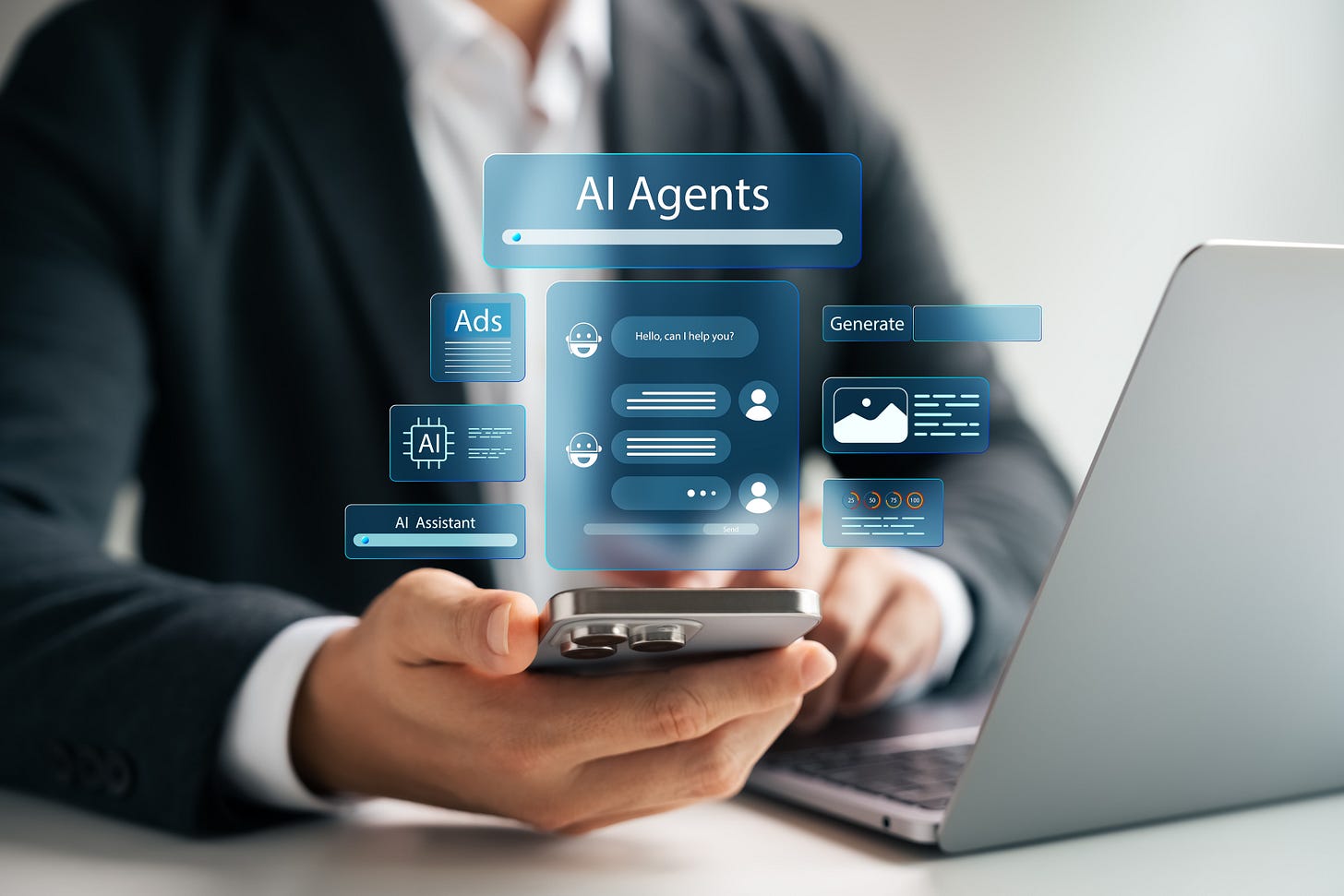Why AI Agents Will Matter for Associations
The emerging AI agent marketplace holds great promise for resource-stricken professional organizations.
I am speaking on AI Agents next week at ASAE-MMC. In advance of the conference, I am posting some of my thoughts about this new emerging use of AI tools.
In general, AI agents are far from mature as a toolset for associations (and enterprises in general). Because, in most early cases, agents focus on automating repetitive operational tasks, they have obvious ties to associations' particular challenges. This makes agents prime candidates to benefit from thoughtful agent implementation.
Associations face constant pressure to deliver more member value while containing operational costs. Domain-specific data, limited staff resources, diverse member needs, and expectations for high-touch service delivery make agents compelling beyond general business applications. Traditional solutions often force a tradeoff between quality and scale. AI agents offer a way out of this dilemma, enabling associations to enhance member services while optimizing resource allocation.
The pandemic accelerated digital transformation across the association sector, with many organizations seeing 3-5 years of planned technology adoption compressed into months. This rapid shift created new opportunities but also exposed significant operational gaps. While associations adapted, their private sector counterparts went even further, creating strong virtual supply chains.
Members – who are also consumers and use these enterprise systems – now expect Amazon-like experiences from every organization they engage with, including their professional associations. AI agents can help bridge this expectation gap.
Association-Specific Opportunities for AI Agents
Let’s get straight into use cases. Here are just a few of the distinct operational areas particular to associations where AI agents can deliver immediate impact for associations:
Membership Management
The lifeblood of associations—members—requires consistent nurturing and attention. AI agents can transform member journeys by identifying potential drop points and endangered members, automating renewal processes, and personalizing onboarding experiences. For example, when a member's behavior indicates potential disengagement, an AI agent can trigger appropriate interventions before renewal time, potentially saving that membership.
Last year at ASAE-MMC, the American Banking Association revealed it had identified a drop point in its member journey at the four-year mark using sophisticated analytics. Now imagine an agent alerting membership, when individual members are in that critical time period and showing signs of disengagement with suggested potential interventions it could enact (or not, depending on the membership director’s perspective).
Event Operations
Association events consume enormous staff resources. Registration management, speaker coordination, exhibitor communications, and logistics planning often overwhelm even the most organized teams. AI agents can handle routine communications, deadline management, personalized attendee experiences, and show floor moments.
This kind of trade show management is quickly becoming the expectation for events and the software providers serving the trade show and conference sector. For example, Cvent is now offering AI-powered networking for conference attendees.
Anyone who has spoken at a conference has gotten the nudge to register and submit their presentation. A trade association could deploy an AI agent to manage its speaker coordination process. The agent would send deadline reminders, collect materials, validate format compliance, and answer common questions—all without staff intervention for routine cases. This would reduce staff time allocation by 40% while improving speaker satisfaction scores.
Worried about a human getting replaced? Have you ever worked a conference for an association? More likely, staff are getting pulled off their actual duties to help crash the trade show conference work, and make sure the exhibitor and attendee experience is fulfilled. A conference AI agent would only relieve the association of workload imbalances caused by short staffing.
Professional Development
Continuing education represents both a mission imperative and revenue stream for many associations. AI agents can transform this area by creating personalized learning pathways, tracking certification requirements, identifying knowledge gaps, and recommending appropriate educational resources.
We’re working with a healthcare association that is building AI agents that will analyze member profiles, past learning history, and industry requirements to suggest relevant continuing education. The agent could track progress toward certification and provide just-in-time reminders about expiring credentials. We expect the association could see a 30% increase in educational product revenue and improved member experiences.
Governance and Committee Support
Board meetings, committee work, and volunteer management require significant coordination. AI agents can prepare meeting materials, take minutes, track action items, facilitate follow-up, and maintain institutional knowledge across leadership transitions. Assuming privacy issues and legal risks are addressed, meeting agents can be extraordinarily powerful for an association.
Consider an AI agent that prepares board briefing book drafts by automatically gathering committee reports, financial updates, and industry news items. The agent could also track governance decisions and precedents in prior meeting notes, making them easily accessible when similar issues arise. Preparation time could be reduced by as much as 60% while improving the quality of information available to decision-makers.
Assessing Your Association's Readiness
The enthusiasm for AI agents must be tempered with an honest assessment of technology maturity and organizational readiness. AI agent platforms are just starting to become realized, from Salesforce, Microsoft and a host of vendors who are using agentic frameworks like Autogen & Semantic Kernel (Microsoft), LlamaIndex, Langchain & Langgraph, and CrewAI.
Similarly, associations face unique readiness challenges including data fragmentation, financial and human resources, organizational readiness, governance complexity, and staff digital literacy. Really, agentic AI, while more pragmatic than many forms of generative AI, is just another form of next gen technology. If associations are struggling with analytics and simple generative AI use cases, they should expect agentic to be difficult, too.
I wrote an article detailing the many issues an organization faces recently. Do check it out.
AI Agents: Beyond the Hype
AI agents are at the peak of hype. Like most pragmatists, I believe we’re still quite a way from making AI agents a widespread reality. The technology is still largely theoretical, and there are many preconditions to deploying successful Agentic AI. It's hard to see most enterprises deploying them at scale on an operational level. After all, most compan…
The Future: Associations and AI Agents in 2025 and Beyond
As we look toward the remainder of 2025 and beyond, several trends are emerging that will shape how associations leverage AI agents. For association leaders, the AI agent revolution presents both opportunity and challenge. The organizations that succeed won't be those that adopt the technology fastest, but those that implement with purpose, discipline, and a clear understanding of their unique needs.
The association community has always been about bringing people together for collective advancement. AI agents offer a powerful new tool to scale resources intelligently, allowing people to do the member-facing work with the most impact and fulfill their mission in ways previously unimaginable.
I am looking forward to discussing further at ASAE-MMC.
All images created with AI, but licensed on Adobe Stock.








